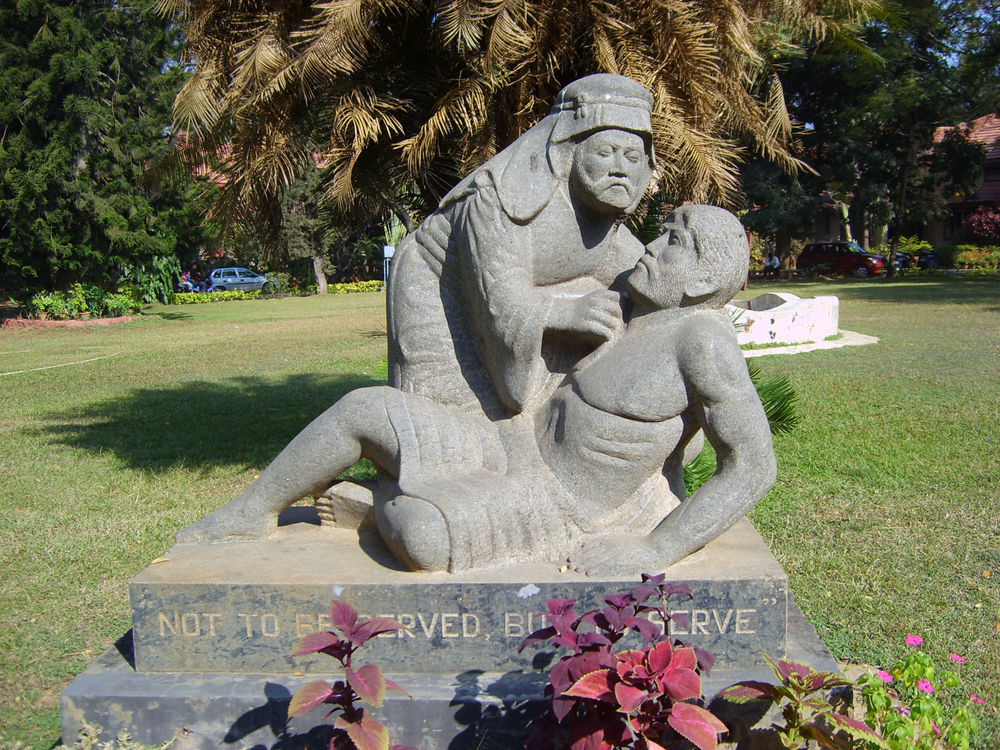From sociologists Christian Smith and Melinda Lundquist Denton’s worries over “moral therapeutic deism” in their 2005 book, to the Pew Research Center’s documentation of the growing trend of religious “nones” (people who claim no religious affiliation), to common claims that we now live in a “post-Christian” culture, the idea that religion and modern affluence cannot coexist has deep roots. Indeed, one might go back further and cite sociologist Max Weber’s The Protestant Ethic and the Spirit of Capitalism.
Peter Berger wrote an excellent rejoinder to the secularization thesis 12 years ago, noting that on the whole the phenomenon has not panned out as many feared. And yet … one cannot deny that, even in the United States, affluence and faith stand in inverse relationship. In 2014, Pew recorded that 14% of people who make over $100,000 per year identify as atheists compared to half that, 7%, among those who make $30,000 or less.
So it makes some sense to expect that increased affluence means decreased faith and religiosity, but why? And is this something modern and new? Or is it timeless?
While orders of magnitude more people, due to modern market economies, enjoy the blessings of affluence today than in the preindustrial world, human nature stays the same. Jesus warned, “Woe to you who are rich, for you have received your consolation” (Luke 6:24). When a rich young man came to him and asked, “What must I do that I may have eternal life?” (Matt 19:16), Jesus told him to follow the commandments, which the man claimed to do. Yet apparently he still felt unfulfilled, further asking Jesus, “What do I still lack?” (Matt 19:20). To which Jesus replied, “Go, sell what you have and give to the poor, and you will have treasure in heaven; and come, follow me” (Matt 19:21). Instead, the young man goes away sorrowful, and Jesus laments, “How hard it is for those who have riches to enter the kingdom of God!” (Mark 10:23).
The data above seem to indicate that Jesus’ lament holds for our modern affluence.
But wait a minute. Isn’t salvation a “free gift” (see Rom 5:15–16)? Don’t Christians believe “by grace you have been saved” and “not of works” (Eph 2:8–9)? How then can it also be “hard”?
The difference comes from one’s perspective, not just materially but spiritually. Jesus not only said, “Blessed are you poor” (Luke 6:20), but also “Blessed are the poor in spirit” (Matt 5:3). And when his disciples asked him, “Who then can be saved?” he responded, “With God all things are possible” (Mark 10:26–27). Moreover, he comforted all those “who labor and are heavy laden,” by assuring them that “my yoke is easy and my burden is light” (Matt 11:30).
So for “those who have riches,” the life in Christ is “hard.” But for the “heavy laden,” it is “easy.”
While Christians disagree over the place of good works in our salvation, few would deny their importance. At the end of all things, all will be judged “according to their works” (Rev 20:12). Jesus even says that when we care for others, “You did it to me” (Matt 25:40). Moreover, he says this will be the basis by which he will separate the just from the wicked. So one way or another, works matter. But works are, well, “hard.” Have you ever tried actually loving your neighbor? It can be hard enough just to like them!
But imagine for a moment—if you have no personal experience to draw from—that you desperately needed your neighbor. Many of us have experienced such hardship. Maybe your family wasn’t loving and supportive. Maybe you lost your job and couldn’t pay the bills. Maybe no one believed that you had something to contribute, and your efforts and ideas were dismissed or marginalized. All you wanted was someone to listen to you and understand. Whether or not that’s you, Jesus calls out, “Come to me … for I am gentle and lowly in heart, and you will find rest for your souls” (Matt 11:28-29). By comparison with the hardships this world brings, following Jesus is a cakewalk. Prayer? Fasting? Almsgiving? Simplicity? Forgiveness? Repentance? No problem! The work of loving our neighbor is easier the more we understand how much we need both God and them.
Many saints of the Church, such as Jerome, Augustine, and Ambrose, urge us to see ourselves in Jesus’ parable of the Good Samaritan—but not as the Samaritan! Rather, they emphasize that we are all, affluent or otherwise, the man that “fell among thieves, who stripped him of his clothing, wounded him, and departed, leaving him half dead” (Luke 10:30). Jesus is our Good Samaritan, and only when we’ve realized our true condition and experienced his mercy can we be Good Samaritans to others.
Which brings us back to affluence. Healthy families and friendships, sufficient material provision, meaningful work—these are all blessings for which we should be grateful if we have them. But we must also beware not to place our worth in these things. Clinging to Christ is indeed “easy” for those who’ve been deprived of such blessings, for whom much of life has been toil and curse. With the scales of affluence removed from our eyes through ascetic practices, we can see our condition as it really is and use our resources to serve others, and Christ in them.
And if you haven’t had the bittersweet blessing of personal hardship to draw from, look around. No doubt with the right perspective, you can find the face of Christ in those suffering beside you. With all our affluence today, rather than worrying over waning faith and despairing over our salvation, we ought to see the tremendous opportunity that affluence affords us to love our neighbors on a scale premodern people could never imagine. Such different outlook could make all the difference in the world—and beyond.

